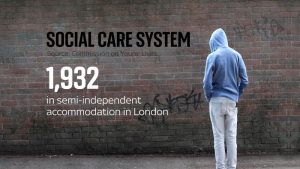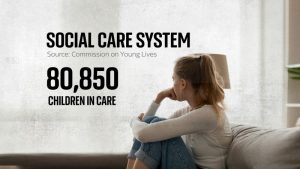The Independent Commission on Young Lives says some children who go into care are “more likely to experience instability through multiple placement moves and changes in social worker”, while in some cases they are moved into “completely unsuitable” accommodation.
The social care system in England is not fit for purpose and “may as well be handing over children directly to ruthless gangs and criminals”, according to a leading children’s rights campaigner.
Anne Longfield, a former children’s commissioner for England, says some teenagers taken into care to safeguard them from county lines and criminal exploitation are being put at risk of more serious harm.
She said: “A children’s social care system that is supposed to protect vulnerable teenagers is frequently putting them in even greater danger.
“Often, we may as well be handing over children directly to ruthless gangs and criminals. It is unfit for purpose.”
Ms Longfield founded and chairs the independent Commission on Young Lives, which has been funded by a charity to produce a series of reports on children’s care in England.
The commission’s first report, Out of Harm’s Way, says the care system in place to support vulnerable teenagers is “infuriatingly inadequate” and has been designed with younger children in mind.
It says some children who go into care are “more likely to experience instability through multiple placement moves and changes in social worker”, while in some cases they are moved into “completely unsuitable” accommodation.
Citing official figures that show 80,850 children were in care in England in March 2021, it found many teenagers in crisis are being moved away from their local area and support networks, sometimes to areas with high levels of crime.
It also found that the number of 16-year-olds entering care almost quadrupled over the past decade, with 16 and 17-year-olds now making up 23% of those in care.

Rachel Musekiwa, a 21-year-old university undergraduate who spent a decade of her childhood in care in Oldham, told Sky News she knows foster children who got involved in drugs and crime.
“At 16 and 17 you’re still finding yourself, you’re still very young, you still don’t know how to navigate the world,” she said.
“I almost found myself joining them because it was like ‘If all the other foster children are doing this, let’s just be the stereotype’.
“A lot of young people fall into that trap just because it’s a stereotype and there’s not that support.”
The report makes a series of recommendations, calling on the government to set up a Vulnerable Teenagers At Risk ministerial task force, and says the Department for Education should establish a Teenager in Care package of support including the financing of new local community children’s homes.

A Department for Education spokesperson said: “We recognise many vulnerable young people face new and growing risks, which is why we are providing targeted support through our specialist alternative provision and SAFE taskforces, backed by £45 million, to keep these young people engaged in their education and to prevent them becoming involved in criminal activity.
“While the independent review of children’s social care continues, we are urgently reforming the system to address growing pressures.
“This includes by introducing national standards and new oversight from Ofsted for supported accommodation, and maintaining and increasing the number of places in these homes backed by £259 million.”

